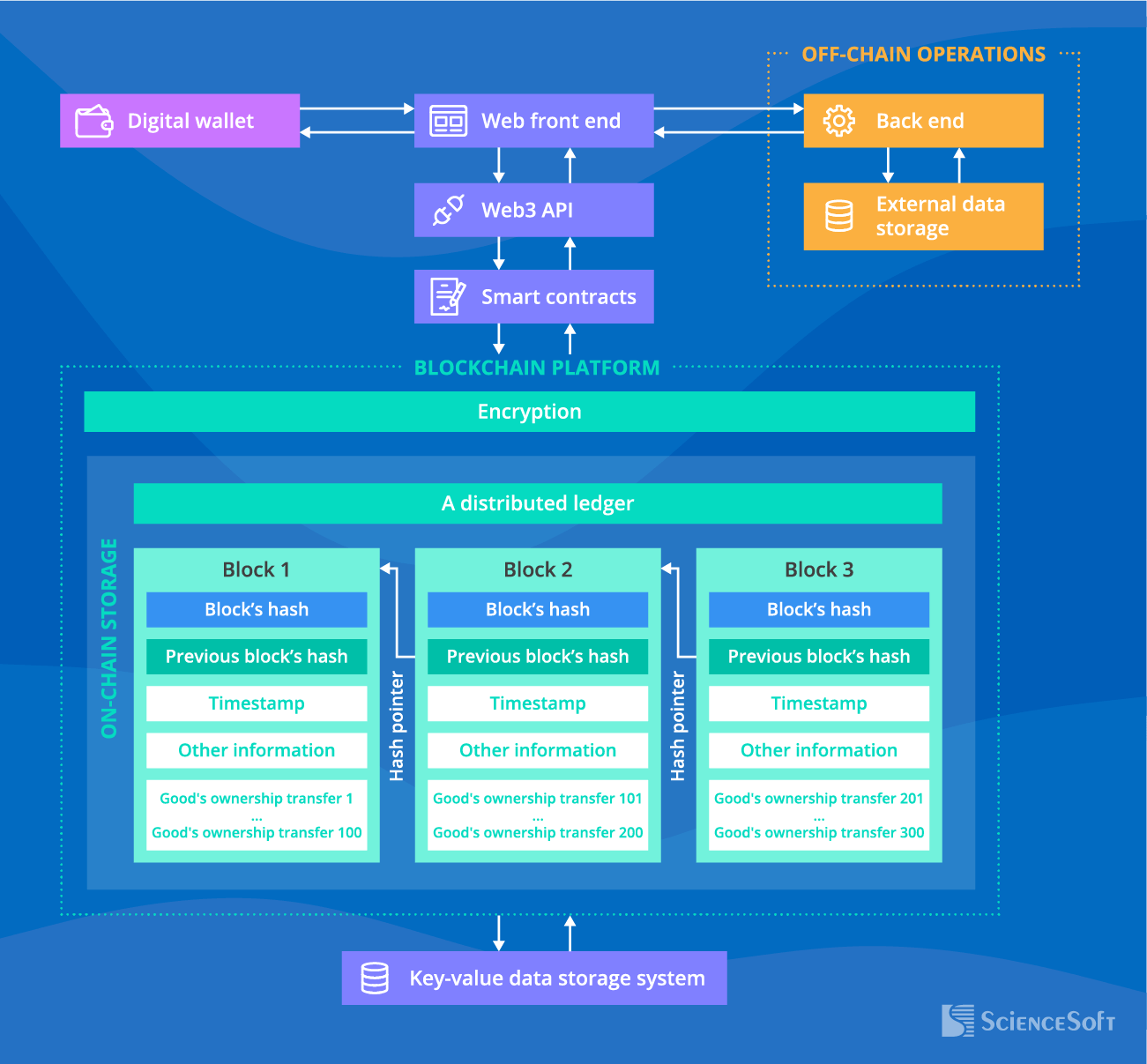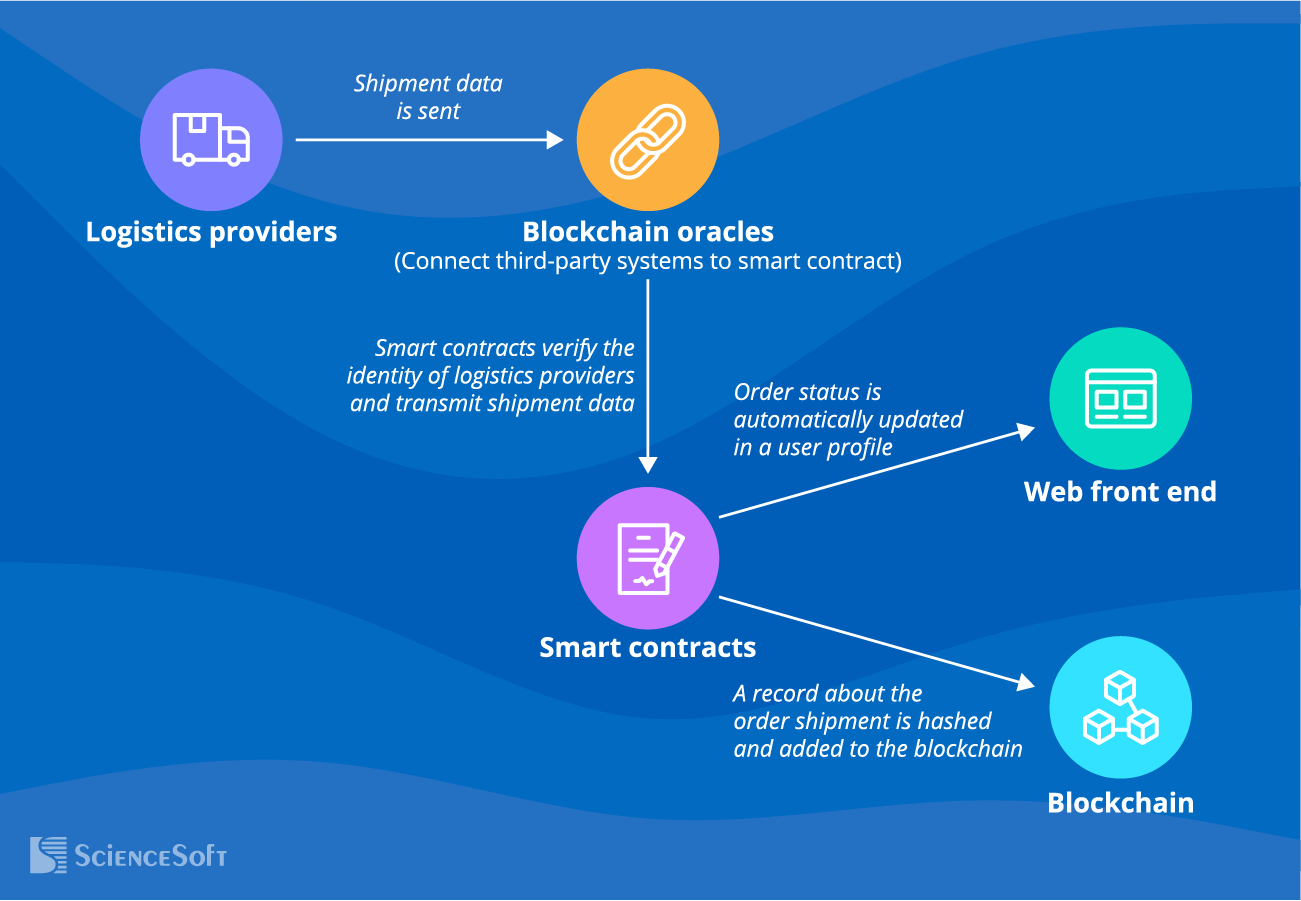Blockchain-Based Decentralized Marketplace
A solution to enable transparent payment transactions and increase user trust
In the development of blockchain-based decentralized apps since 2020, ScienceSoft will help you conceptualize and create a cost-effective online marketplace powered by the blockchain technology.
ScienceSoft’s Brief on Decentralized Marketplaces
A blockchain-based marketplace enables crypto payments and intermediary-free exchange of goods between sellers and buyers. Buyers can view the origins and history of goods stored on the blockchain, which builds trust to sellers and makes the deals more transparent.
- Operational logic. Smart contracts define all the rules and regulations of a marketplace while escrow contracts mediate buyer-seller transactions and safeguard buyers by releasing the paid tokens to sellers only upon the fulfillment of their obligations.
- Use cases. Blockchain marketplaces can be used to sell any kinds of goods: physical (e.g., clothes), digital (e.g., eBooks), NFTs (e.g., art).
- Functionality. The functionality of blockchain-based marketplace rests on three key functions:
- Buyer-seller interactions on the front end.
- Processing and verification of buying transactions.
- A transparent reputation system.
- Rationale. Lower transaction fees* is the most vivid factor contributing to the ROI from choosing a decentralized marketplace ecosystem.
- Development cost. Starting cost of a blockchain-based marketplace is around $100,000. You're welcome to use our free calculator to estimate the budget for your case.
- Success tips. Blockchain security audit and thorough testing of smart contracts are critical for their proper performance as contracts can’t be modified upon the deployment.
*Transaction fees depend on the blockchain platform used in the project.
Blockchain-Based Marketplace vs. Centralized Marketplace
ScienceSoft’s list of major changes that blockchain brings to the marketplace model will help you envisage the business value and decide if the investment is worth it.
|
|
Lower transaction costs and higher margin for sellers. Blockchain gas fees are determined by the protocol used and don’t depend on the item’s price. For example, Solana blockchain built on the proof-of-stake protocol has an average transaction cost of $0.0000000024 and the fee will be equal for items priced $5 and $5,000. The fees charged by traditional payment systems are commonly higher, for example 2.59% + $0.49 per transaction is charged by Braintree for payment with credit cards and via digital wallets. Lower transaction costs result in higher margins and profit for sellers. |
|
|
Better privacy and security for marketplace users. Transactional information isn’t stored centrally but gets instantly encrypted on the blockchain. This makes it immune to breach and theft. |
|
|
Flexible marketplace moderation. Smart contracts underlie all the business logic, permissions and regulations of a marketplace, so it can exist without third-party moderation if you envision uncensored and unbiased space. In this case, you can introduce a system of downvoting to trace unfavorable behavior. Still, you can retain manual moderation over certain aspects (for example, monitor the artworks being sold if you want to restrict controversial topics like violence or religion). |
|
|
Honest product reviews. Smart contracts validate the authenticity of users giving feedback on products and ensure immutability of reviews upon the submission. |
Architecture of a Blockchain-Based Decentralized Marketplace
ScienceSoft builds decentralized marketplaces of the following components.

- Digital wallet is an app to send and receive crypto tokens used for payment transactions on a decentralized marketplace.
-
The front-end layer is a web application accessible for users. It is created for two user roles – sellers and buyers.
-
The back-end layer processes data that will be stored outside the blockchain (e.g., product listings).
-
Web3 API provides the connection between the web front end and smart contracts.
-
Smart contracts enable verification of marketplace transactions between sellers and buyers.
-
The blockchain encrypts and stores transactional data.
-
Key-value data storage system is used to keep the blockchain metadata.
-
External data storage (often IPFS) is used in distributed blockchain-based systems for user-generated content (product listings).
Key Functions of a Decentralized Marketplace
When planning the functionality of decentralized marketplaces, ScienceSoft takes the following capabilities as a basis and adapts the plan to individual project requirements.
Role-based user experience
In the absence of a central controlling authority, user journeys for sellers and buyers must be intuitive and frictionless.
Selling process
- Adding and editing product listings.
- Product inventory management.
- Order and return management.
- Private messaging system between sellers and buyers.
Buying process
- Faceted catalog browsing.
- Support for a multi-vendor shopping cart.
- Order placement.
- Order tracking.
- Order history.
Marketplace transactions verification
Marketplace smart contracts
Marketplace smart contracts serve as the back-end business logic of the marketplace – they define how the user behavior unfolds depending on the input data. At the core, they manage the processes of listing, choosing and purchasing products.
Escrow smart contracts
As payment transactions are conducted directly between sellers and buyers, without a payment provider in between, escrow smart contracts provide guarantees for the parties. They hold the tokens transferred by the buyer until the purchased item is delivered and then release the tokens to the seller.
Proprietary cryptocurrency
Marketplaces may have a settlement currency created using privacy-preserving protocols, which means that users’ personal information will not be collected during transactions.
Integration of cryptocurrency payments
You may implement other cryptocurrencies your marketplace will support. Bitcoin is a go-to choice as the most widely accepted cryptocurrency.
Hashing
Each blockchain record contains a unique cryptographic hash and a timestamp to protect the information from tampering and hacking.
Reputation system
Proof-of-individuality framework
It enables user verification to prevent fake and duplicate user accounts and manipulation of sellers’ reputation.
Product reviews
Review submission is controlled by smart contracts to authorize reviews from buyers of a particular product only.
Flagging, upvoting and downvoting
As a way to moderate a decentralized marketplace, you can introduce a system where users flag products that violate their values or marketplace policy and thus trigger the process of upvoting/downvoting by other users. The product is banned from the marketplace if it exceeds the threshold of downvotes.
Logistics Organization for a Decentralized Marketplace
To ensure a smooth process of physical delivery of goods, ScienceSoft recommends integrating logistics providers with a marketplace. As smart contracts can’t interact with outside systems, there will an intermediary – a third-party service named blockchain oracle.

How ScienceSoft Achieves Apt Functioning of Decentralized Marketplaces
Rigorous testing of smart contracts
The best practice is testing both internal and external behavior of smart contracts. This approach requires three types of tests:
- Functional testing to check if a smart contract returns the right values.
- Performance testing to analyze the throughput and latency of smart contracts.
- Integration testing to verify the interaction between smart contracts, including Web3.js tests to run through the interaction between the marketplace front end and smart contracts.
Security is a critical aspect to think of when creating smart contracts as the code of smart contracts can’t be modified after deployment to patch security vulnerabilities. As a rule, companies programming smart contracts can execute an independent audit, like we do at ScienceSoft.
Explore Our Featured Decentralized Marketplace Projects
4 results for:
Investment and ROI to Expect
ROI factors
- Lower fees on crypto payment transactions compared to fees required by standard payment systems.
- Transparent and trustworthy reputation system for sellers.
- Better engagement of buyers cautious about their personal data as it’s not collected and stored and thus can’t be stolen from the back end.
- Less third-party involvement is needed to mediate the trading process.
ScienceSoft Shortlists the Best-Suited Blockchain Platforms
Solana
Description
A permissionless blockchain framework. Uses a proof-of-stake protocol, the most energy-efficient blockchain protocol. Offers faster transaction processing and lower transaction fees compared to more hyped peers like Ethereum.
Source code
Open-source protocol
Ethereum
Description
Powers thousands of decentralized apps. Supports a variety of programming languages, including .Net, Java, Go, Python, Ruby, and others. Has a solid base of development materials created by the backing community: development frameworks, APIs, testing tools.
Source code
Open-source protocol
Hyperledger Fabric
Description
A private blockchain framework. Has a modular architecture that facilitates the transaction processing workflow and improves the network scalability. Supports a plug-and-play approach allowing to reuse existing functions and modules instead of building them from scratch.
Source code
Open-source protocol
Decentralized Marketplace Implementation | Services by ScienceSoft
If you are ready to transform a marketplace model and the way people trade things, ScienceSoft will bring the expertise in building blockchain-based decentralized apps to embody your business idea. Our approach rests on the closest attention to quality and business value, ensuring technically and economically feasible solution design and driving quick delivery.
Our consulting services
- Elaborating on the high-level concept of the marketplace: its unique value proposition, target audience, marketability.
- Creating a business case weighing up investment against the estimated ROI.
- Documenting a full functional and architectural map of the marketplace.
- Selecting an optimal technology stack.
Our development services
- Creating the front end of a user-facing web app integrated with Web3.js.
- Integrating a digital wallet.
- Creating smart contracts.
- Integrating the web app with the blockchain network and data storage.
- Optionally: setting up required integrations with third-party systems.

About ScienceSoft
A provider of blockchain development services since 2020, ScienceSoft works with all the leading blockchain platforms to build decentralized apps. The high quality and customer-centered approach are a cornerstone of our service delivery model, which is recognized by reliable authorities like the International Organization for Standardization (ScienceSoft is ISO 9001 and ISO 27001 certified) and International Association of Outsourcing Professionals (ScienceSoft is included in the 2023 Global Outsourcing 100 list).

 Schedule a call
Schedule a call

 Schedule a call
Schedule a call